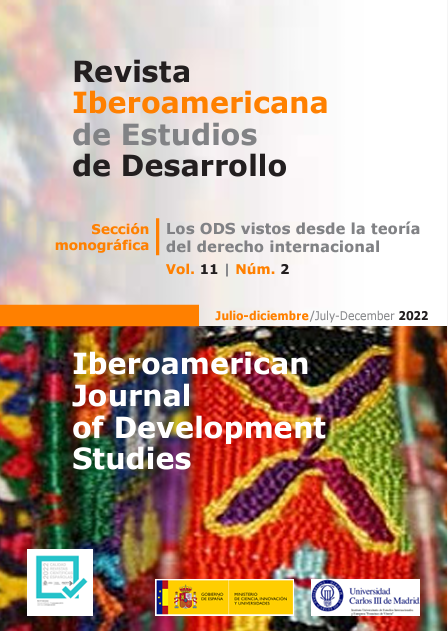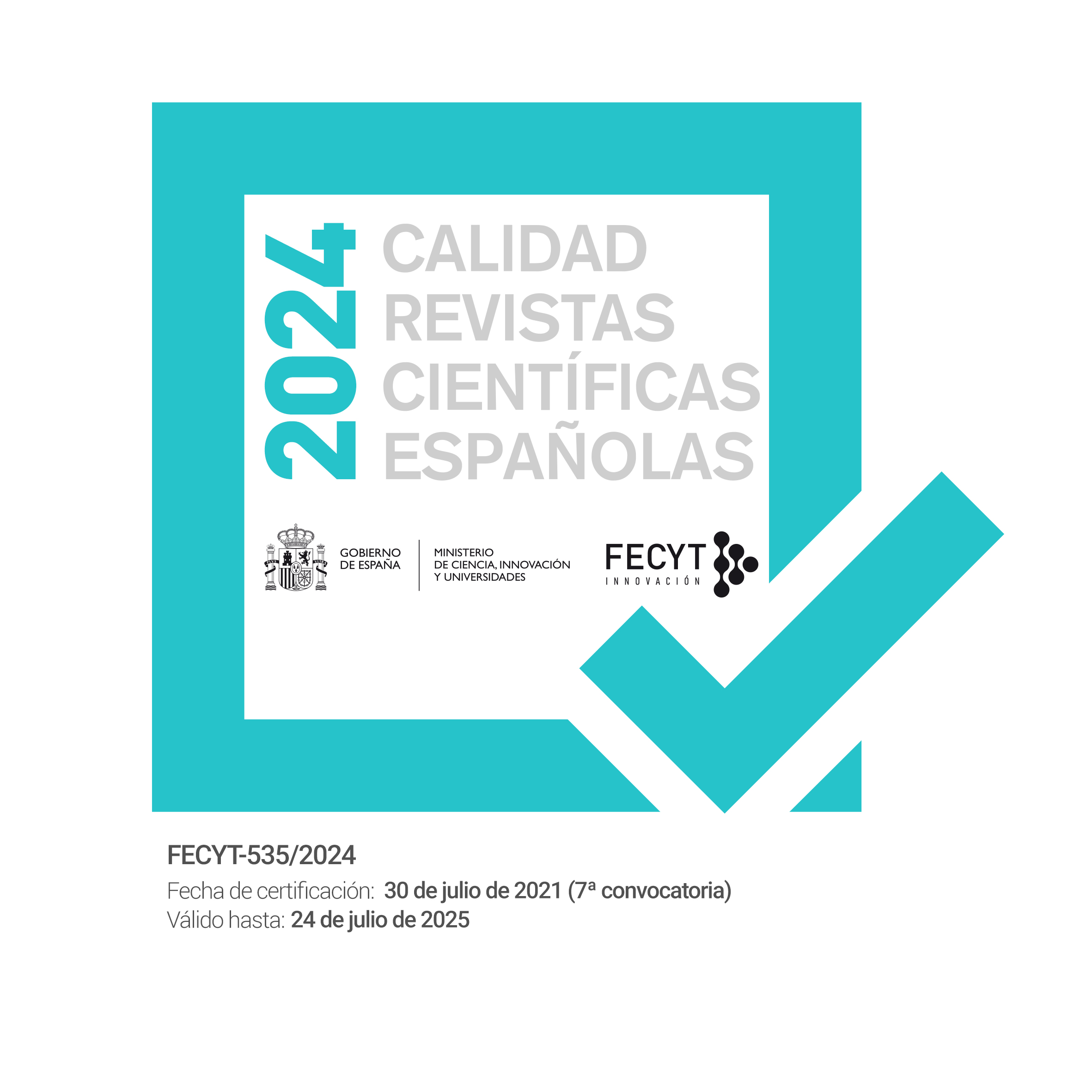Agenda 2030 and sustainable development: some reflections on its legal nature and implementation on international law for States and business
DOI:
https://doi.org/10.26754/ojs_ried/ijds.689Keywords:
Agenda 2030, Sustainable Development, SDGs, international responsibility, UN Guiding PrinciplesAbstract
The 2030 Agenda was approved by the General Assembly in 2015. However, its resolutions are not legally binding, so it is unclear what kind of obligations it establishes and the possible international liability that would arise from non-compliance. Being an instrument of soft law or soft law, its application depends to a greater extent on the acceptance of the states, which is a political advantage that should not be underestimated. Also, soft law rules often drive the development of international law, helping to lay the foundation for codification and even facilitating the creation of customary international law. This article aims to analyze the legal nature of the Agenda from an international normative point of view and also examine how its content can be articulated in accordance with International Law for states and for companies as non-state actors whose role is key in achieving the Sustainable Development Goals (SDGs).
Downloads
References
ABBOTT KW, BERNSTEIN S (2015). The High-Level Political Forum on Sustainable Development: Orchestration by Default and Design. Global Policy 6(3):222-233.
AGNU (ASAMBLEA GENERAL DE NACIONES UNIDAS) (2015). Transformar nuestro mundo: La Agenda 2030 para el Desarrollo Sostenible, 25 de septiembre, A/RES/70/1.
BEXELL M, JÖNSSON K (2017). Responsibility and the United Nations’ Sustainable Development Goals. Forum for Development Studies 44 (1):13-29.
BIERMANN F, KANIEAND N, KIM R (2017). Global governance by goal-setting: the novel approach of the UN Sustainable Development Goals. Current Opinion in Environmental Sustainability 26-27:26-31.
BODANSKY D (1995). Customary (and not so customary) international environmental law. Indiana Journal of Global Legal Studies 3(1):105-119.
CORTE INTERNACIONAL DE JUSTICIA (1969). North Sea Continental Shelf, Judgment, Reports.
DÍAZ-GALÁN E (2021) El valor jurídico de la Agenda 2030 sobre Desarrollo Sostenible: ¿una nueva tendencia normativa? Iberoamerican Journal of Development Studies, en prensa.
DONALD K, WAY SA (2016). Accountability for the Sustainable Development Goals: A Lost Opportunity? Ethics & International Affairs 30(2):201-213.
ERSKINE T (2003). Assigning Responsibilities to Institutional Moral Agents: The Case of States and «Quasi-States». En: Erskine T (ed.). Can Institutions Have Responsibilities? Collective Moral Agency and International Relations. Palgrave Macmillan, Nueva York, pp. 19-24.
FERNÁNDEZ LIESA C (2016) Transformaciones del Derecho internacional por los objetivos de desarrollo sostenible. Anuario español de derecho internacional 32:49-81.
FERNÁNDEZ LIESA C, DÍEZ BARRADO C, VERDIALES LÓPEZ D (2018). Objetivos de Desarrollo Sostenible: paz, justicia e instituciones sólidas/derechos humanos y empresas. Instituto De Estudios Internacionales y Europeos Francisco De Vitoria, Madrid.
FUKUDA-PARR S, MCNEILL D (2015). Post 2015: A new era of accountability? Journal of Global Ethics 11(1):10-17.
FUKUDA-PARR S, YAMIN AE, GREENSTEIN J (2014). The power of numbers: A critical review of millennium development goal targets for human development and human rights. Journal of Human Development and Capabilities 15(2-3):105-117.
GARCÍA MARTÍN L (2021). Empresas y Derechos Humanos y en la Agenda 2030: un examen de sus posibles confluencias en la consecución del desarrollo sostenible. Anuario de los Cursos de Derechos Humanos de Donosti-San Sebastián, Tirant lo Blanch.
JERVEN M (2014). Benefits and costs of the data for development targets for the post-2015 development agenda. Copenhagen Consensus Center Working Paper.
KALTENBORN M, KRAJEWSKI M, KUHN H (2015). Sustainable Development Goals and Human Rights, Springer.
KIM RE (2016). The Nexus between International Law and the Sustainable Development Goals. Review of European, Comparative and International Environmental Law 25(1):15-26.
MÁRQUEZ CARRASCO C (2020). Desarrollo Sostenible, Empresas y Derechos Humanos: la incorporación de los Tres Pilares «Proteger, Respetar, Remediar» en la Aplicación de los ODS. En: Morán Blanco S, Hernández Barrón A. Empresas, Derechos Humanos y Cooperación al Desarrollo en el Marco de la Agenda 2030 para el Desarrollo Sostenible, Instituto de Estudios Internacionales y Europeos Francisco de Vitoria. Universidad Carlos III de Madrid, Madrid, pp. 63-86.
PATTBERG P, WIDERBERG O (2016). Transnational multistakeholder partnerships for sustainable development: Conditions for success. Ambio 45(1):42-51.
POGGE T, SENGUPTA M (2015). The sustainable development goals: A plan for building a better world? Journal of Global Ethics 11(1):56-64.
RABINOVYCH M (2020). Legal Status and Effects of the Agenda 2030 Within the EU Legal Order. Journal of Contemporary European Research 16(2):182-199.
SAINZ-BORGO JC (2020). Los Objetivos de Desarrollo Sustentable y la Agenda 2030 desde una perspectiva jurídico internacional. En: López de Goicoechea Zabala J, Pascucci de Ponte E. Estado de Derecho, Políticas Públicas y Derechos Humanos. Thomson Reuters Aranzadi, Madrid, pp. 789-815.
SCHAFFER G, POLLACK M (2010). Hard vs. Soft Law: Alternatives, Complements and Antagonists in International Governance. Minnessota Law Review 94(3):706-799.
VERDIALES LÓPEZ D (2020). Empresas y Derechos Humanos: un binomio imprescindible para el logro de los Objetivos de Desarrollo Sostenible. En: Morán Blanco S, Hernández Barrón A. Empresas, Derechos Humanos y Cooperación al Desarrollo en el Marco de la Agenda 2030 para el Desarrollo Sostenible. Instituto de Estudios Internacionales y Europeos Francisco de Vitoria, Universidad Carlos III de Madrid, Madrid, pp. 129-161.
YOUNG IM (2006). Responsibility and global justice: A social connection model. Social Philosophy and Policy 23(1):102-130.
Downloads
Published
How to Cite
Issue
Section
License
Copyright (c) 2022 Laura García-Martín

This work is licensed under a Creative Commons Attribution-NonCommercial-NoDerivatives 4.0 International License.








